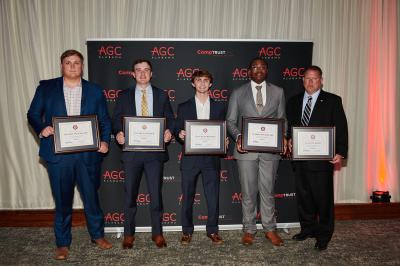The Delaware Contractors Association (DCA) held its second Governmental Breakfast of 2003 on Thursday, March 20. The event featured Delaware Speaker of the House Terry Spence and Delaware Senate Majority Leader Harris McDowell.
Spence was elected to Delaware’s House of Representatives in 1980 and has served as the Speaker since 1988. He is the longest serving speaker in the state’s history. During his tenure, Spence has championed reforms in education, finance and public safety.
Sen. McDowell is the third most senior of Delaware’s senators, having served since 1976. He was elected the Majority Leader this past January.
During the breakfast, both speakers shared their thoughts and answered questions on a variety of legislative issues ranging from the statewide smoking ban to education reform.
“I would like to thank John McMahon and the DCA for its strong partnership with the state to benefit those who live here and those who travel here,” Spence said. “We appreciate the relationship that has been forged here — that is one of the great things about Delaware — we all know each other and I know that other states are envious of that.”
He added that DCA Director of Government Relations John J. Casey, is one of the most respected representatives from the construction industry by both Democrats and Republicans in the state legislature.
“Thanks to his commitment, we pay attention and want to do what’s right for your industry,” Spence said.
Specific to the construction industry, Casey and Spence enlightened the attendees on the status of Project Labor Agreements, or PLAs, in Delaware. A PLA is a program that a state or federal agency puts into place stating that any employer who is going to bid out work must use union contractors.
“Last Friday [March 14], we became aware,” Casey explained, “that a memo was sent to cabinet secretaries asking them to consider PLAs on state projects.” Casey added that the PLAs would not apply to school districts or federally-funded projects. He said that the PLA discussion had been circulated only as a memo, and as of now, there has been no executive order to put the agreements into place.
Spence added, “Since this is just a memo, it is important to know that the door is open for discussion.”
Switching gears to the state’s budget, as of Jan. 30, Spence said, the budget was suffering from a $300-million shortfall. “You’re feeling, it, the state’s feeling it — it has been a real concern,” he said. He reviewed Gov. Ruth Ann Minner’s proposed budget and how it allocates $134 million for state capital projects, a figure he explained would be pertinent to attendees of the breakfast who represent the construction industry.
In light of the onset of war in Iraq, Spence also addressed homeland security, noting that he recently attended a national speakers’ conference in Boston where homeland security was a major issue.
“I feel that a House of Representatives Homeland Security Committee should meet with the governor to offer updates on what’s happening throughout the state. In all honesty, our chemical plants in the northern part of the state and Dover Air Force Base could be possible terrorist targets.” Spence said he believes the state also needs a citizen’s ad hoc committee in this area as well as an 800 number for citizens to report incidents.
Touching on the smoking ban, Spence said that he is a non-smoker but voted in favor of the proposed compromise to the legislation. He explained that $2 million of renovations could make the state’s racetracks properly ventilated and enclosed to allow for smokers. Taprooms and taverns would have to properly mark that they were not smoke-free environments and would still be required to provide smoke-free areas. He said he believes the compromise would still allow for the state to measure at its current 95- to 97-percent smoke-free status.
“I think this is reasonable, given that the state’s three tracks combined are losing $140,000 a day,“ Spence said. “This is concerning a lot of people. I love it now, being smoke free, but out of respect for the financial situation, I’d like to start to generate that $140,000 back again,” he said.
Next Spence addressed the state’s Medicaid crisis. He said he has proposed a committee of professional people who understand Medicaid and how to reduce its costs in Delaware and said that it “looks like it’s going to go forward.” Because of the level of reimbursement businesses were facing, Happy Harry’s and Rite Aid chains were looking toward shutting down their Medicaid service. Spence said that the state is working on a “modest increase” and that the crisis has “been resolved.”
Following Spence, McDowell shared his thoughts on Minner’s proposed budget, his proposed Senate Bill 18 and accountability for taxes that were presented as temporary yet still remain in effect.
McDowell said that he believes Minner is doing “the responsible thing” by proposing the balanced budget. He said that the biggest revenue increase comes with the Business Franchise Tax within the boundaries of inflationary increase.
“This affects the biggest companies in the state and the Joint Finance Committee is wrestling through the details now, but I think we will reach a good point,” he said.
McDowell added that his biggest concerns lie with the state’s economy in 2004 if the employment rate continues to drop and the recession continues. As for what the future holds, the “keys are clear” according to McDowell: improving our entrepreneurial system and our higher education system. “We are calling on all businesses to help with this in Delaware and across the nation,” McDowell said.
“We need to start pumping citizens up higher on the educational ladder,” he added. “Nothing should be left off the table where this is concerned.” He referenced his proposed Senate Bill 18 which he said is a “motivational challenge” to get students through high school graduation and through college who come from families that believe they cannot afford to do so.
“The best investment our nation ever made was in the G.I. Bill and we need the equivalent of that again. But, the percentage of our people who go through the military aren’t enough, we need more people from the general population to improve their education in order to keep driving the economy,” McDowell said.
On the subject of economic development and enhancing the state’s entrepreneurial system, McDowell said that Delaware needs to nurture its ability to come up with new ideas and invest in new things in order to allow new businesses to boost the economy.
Finally, McDowell addressed how important it is to him personally to remain accountable for taxes that were originally proposed as temporary yet are still in effect. The two that he mentioned are the Real Estate Transfer Tax and the Gross Receipts Tax, noting that as a senator, he is responsible to remember that the taxes were presented as temporary and to look for ways to modify them.
For more information, call 302/994-7442.
Today's top stories















